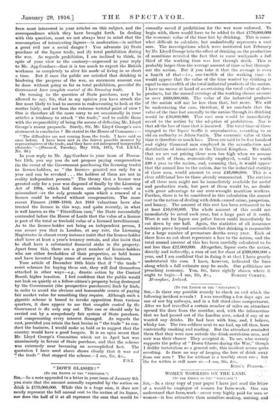"DOWN GLASSES ! "
[To THE EDITOR OF THE " SPEOFITOR."1 Sra,—In a note appended to a letter in your issue of January 8th you state that the amount annually expended by the nation on drink is £170,000,000. While this is a huge sum, it does not nearly represent the full annual cost to the nation of its liqUor, nor does the half of it at all represent the sum that would be annually saved if prohibition for the war were enforced. To begin with, there would have to be added to that £170,000,000 the economic value of the time lost by drinking. This is some- what difficult to calculate, but undoubtedly represents a vast sum. The investigations which were instituted last February by Mr. Lloyd George into the effect of drinking on the production of munitions revealed the fact that in some work-yards a full third of the working time was lost through drink. This is probably larger than the average amount of time so lost through- out the nation. But if you take it that the average is even a fourth of that—i.e., one-twelfth of the working time--it would appear that the value of the time wasted by drinking is equal to one-twelfth of the total industrial products of the nation. I have no means at hand of ascertaining the total value of these products, but the annual earnings of the. working classes amount to over £600,000,000. The value of the industrial products of the nation will not be less than that, but more. We will be understating the ease, therefore, if we conclude that the value of the time lost annually to the nation through its drinking would be £50,000,000. This vast sum would be immediately saved to the nation by tho adoption of prohibition. Nor is that all the loss of time that is incurred. The total time of those engaged in the liquor traffic is unproductive, according to se old an authority as Adam Smith. The economic value of their time is therefore so much loss. There are said to be five hundred and eighty thousand men employed in .tho manufacture and distribution of intoxicants in the United Kingdom. We think that we are not pricing these men too high when we assume that each of them, economically employed, would be worth £80 a year to the nation, and, assuming that, it would appear that the annual loss to the nation, due to the industrial sterility of these men, would amount to over £46,000,000. This is a clear additional loss to those already enumerated.' The services of all these men might not be immediately available for useful and productive work, but part of them would be, no doubt with great advantage to our over-wrought munition workers. Further, there is to be considered in this calculation the annual cost to the nation of dealing with drink-caused crime, pauperism, and lunacy. The amount of this cost has been estimated to be at least £10,000,000. The whole amount of this could not immediately be saved each year, but a large part of it could. Were it not for liquor our police forces could immediately be cut down by one half. Again, the statistics of all insurance societies prove beyond contradiction that drinking is responsible for a large number of premature deaths every year. Each of these lives so cut short represents a loss to the nation, and the total annual amount of this has been carefully calculated to be not less than 02,000,000. Altogether, liquor costs the nation, directly and indirectly, a sum of not far short of £300,000,000 a year, and I am confident that in fixing it at that I. have greatly understated the case. I have, however, indicated the lines along which a full estimate may be made. Our politicians are preaching economy. You, Sir, have rightly shown where it
ought to begin.—I am, Sir, &c., ROBERT CORI:MX. Monaghan, Ireland.


















































 Previous page
Previous page